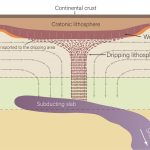One trillion species, 3 billion years: How we used AI to trace the evolution...
There are roughly a trillion species of microorganisms on Earth—the vast majority of which are bacteria.
Bacteria consist of a single cell. They do not...
Arabia’s Desert once had lakes, rivers, and rainforest-like weather, study finds
The Arabian Desert, known today as one of the driest places on Earth, was once full of lakes, rivers, and green landscapes.
Around 9,000 years...
Mammals moved to the ground before dinosaurs disappeared, new study shows
Long before the asteroid hit Earth and wiped out the dinosaurs, many mammals had already started living on the ground, according to new research...
NASA’s Perseverance rover watched a dust devil eat another on Mars
Mars is well known for its seasonal dust storms, which occur when the southern hemisphere experiences summer.
Periodically, these storms grow to engulf the entire...
Scientists find deep-sea plastic hotspots created by underwater avalanches
Scientists have discovered that powerful underwater avalanches are sweeping huge amounts of microplastics into the deep sea, creating hidden pollution hotspots on the ocean...
Scientists reveal bizarre rivers that flow in two directions and break nature’s rules
Most rivers follow a few basic rules: they flow downhill, join other rivers, and eventually end up in the ocean or a lake.
But a...
Even wealthy Americans die sooner than Europeans, study finds
A new study has found that Americans, regardless of how rich they are, are more likely to die earlier than people in Europe with...
Speed cameras in NYC cut crashes by 14%—But it takes 6 months to see...
Speeding is one of the top causes of deadly car crashes, but New York City’s automated speed cameras are helping make the streets safer—especially...
How a new wave of fighter jets could transform aerial combat
The most advanced fighter jets in the world are known as "fifth generation." They contain technologies developed in the first part of the 21st...
Scientists discover North America is slowly ‘dripping’ from below
In a surprising new discovery, scientists have found that the underside of the North American continent is slowly “dripping” away—like blobs of rock melting...










